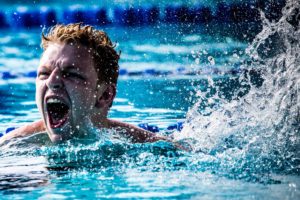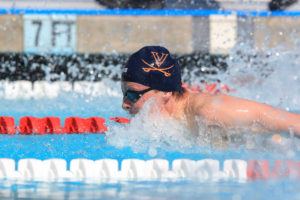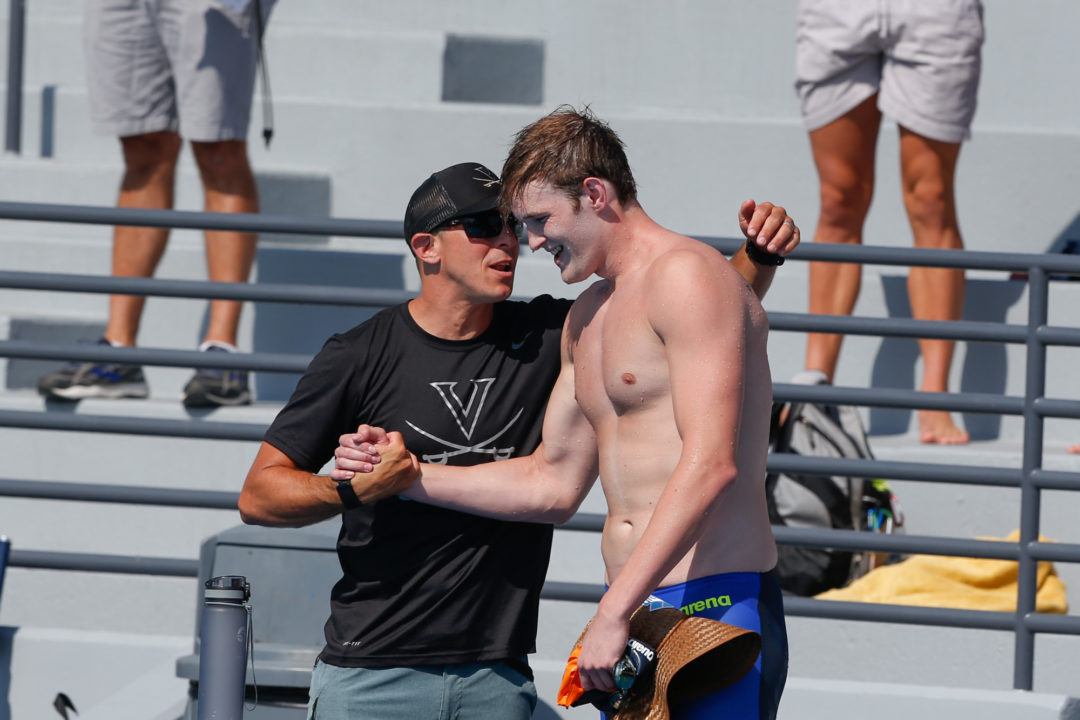We’ll be previewing the top 12 men’s and women’s programs for the 2019-2020 season – stay tuned to our College Swimming Previews channel to catch all 24. Can’t get enough college swimming news? Check out the College Preview issue of SwimSwam Magazine for more in-depth college swimming coverage, including a bird’s-eye view of the flood of coaching changes and our ever-popular rankings of the top 50 individual swimmers in college swimming.
#11 Virginia Cavaliers
Key Losses: Brendan Casey (33 NCAA points), Zach Fong (14 NCAA points, prelims relay), Bryce Keblish (4 NCAA points, 3 relays)
Key Additions: Jack Walker (NC – free),Jack Wright (PA – free), #20 Sean Conway (VA – IM/back), Henry Schutte (MI – sprint free), Max Edwards (NC – sprint fly/free), Konnar Klinksiek (TX – sprint free), Daniel Gyenis (VA – distance), Josh Fong (NJ – fly), August Lamb (VA – free)
GRADING CRITERIA
We’re unveiling a new, more data-based grading criteria in this year’s series. Our grades this year are based on ‘projected returning points’, a stat of our own making. We started with our already-compiled “no senior returning points” (see here and here), which is effectively a rescoring of 2019 NCAAs with seniors removed and underclassmen moved up to fill those gaps. In addition, we manually filtered out points from known redshirts and swimmers turning pro early, while manually adjusting points for outgoing and incoming transfers and adding in projected points for incoming freshmen with NCAA scoring times, as well as athletes returning from injury or redshirts who are very likely NCAA scorers.
Since we only profile the top 12 teams in this format, our grades are designed with that range in mind. In the grand scheme of college swimming and compared to all other college programs, top 12 NCAA programs would pretty much all grade well across the board. But in the interest of making these previews informative, our grading scale is tough – designed to show the tiers between the good stroke groups, the great ones, and the 2015 Texas men’s fly group types.
- 5 star (★★★★★) – a rare, elite NCAA group projected to score 25+ points per event
- 4 star (★★★★) – a very, very good NCAA group projected to score 15-24 points per event
- 3 star (★★★) – a good NCAA group projected to score 5-14 points per event
- 2 star (★★) – a solid NCAA group projected to score 1-4 points per event
- 1 star (★) – an NCAA group that is projected to score no points per event, though that doesn’t mean it’s without potential scorers – they’ll just need to leapfrog some swimmers ahead of them to do it
We’ll grade each event discipline: sprint free (which we define to include all the relay-distance freestyle events, so 50, 100 and 200), distance free, IM, breaststroke, backstroke, butterfly and diving. Bear in mind that our grades and painstaking scoring formula attempts to take into account all factors, but is still unable to perfectly predict the future. Use these grades as a jumping-off point for discussion, rather than a reason to be angry.
2018-2019 Look Back
We struggled to figure out where to accurately rank UVA all of last season. At first, we were pretty high on them, thanks largely to how many points they were projected to return when you eliminated the the 2019 seniors from the results. But when they weren’t particularly lights-out during the fall or at their winter invite, they fell in our rankings as other teams surged.
They showed signs of life at ACCs, where they battled Louisville for 2nd place, ultimately coming up just shy. It was a totally different story come March, as the Cavaliers totally surpassed even our early optimistic projections at NCAAs: the 800 free relay finished 8th overall, senior Brendan Casey scored 33 points, and the team ended up finishing 10th, ahead of perennial powerhouses like Michigan and Stanford.
That’s a marked turnaround for a team that finished 28th in 2016 (15 points), didn’t score a single point in 2017, and finished 29th in 2018 (19 points). In cracking the top ten for the first time since 2011, they answered a question we posed two years ago, right after Augie Busch left for Arizona and Todd DeSorbo arrived from NC State.
Sprint Freestyle: ★★
Under the last two coaching staffs, UVA was known primarily for its distance free, but the lack of a lights-out sprinter has grown particularly acute over the past few seasons, especially with the departures of John Whiteside and then Lewis Burras. Ryan Baker has done admirably serving as the #1 sprinter in the meantime, but he’s not a NCAA scorer at either the 50 or 100.

Jack Walker (photo: Jack Spitser)
Sprint help is coming in the form of a massive recruiting class. This was the new coaching staff’s first full recruiting cycle, and the nabbed a small bevy of top-ranked recruits. This group of “first years” includes the double Jack attack of Jack Walker (20.0/43.5/1:33.7) and Jack Wright (20.2/43.5/1:34.7), both of whom should immediately help on any free relay. Freshmen Henry Schutte (20.0/44.1), Max Edwards (20.2/45.0), and Konnar Klinksiek (20.1/44.8) give DeSorbo plenty of young sprint talent to develop.
No one from that group appears immediately ready to score in the 5o or the 100 free, but Walker’s lifetime best in the 200 free is a little under a second off what it took to score last year. Additionally, Cooper Wozencraft finished 22nd last year with a 1:33.76 in prelims, and with 9 seniors ahead of him now gone, he stands to have a good chance of picking up a few points this season.
Distance Freestyle: ★
The Cavaliers take a big hit here with Casey’s graduation. He and the also-graduated Sam Magnan were the only two UVA men to swim the 500 at NCAAs. Rising junior Matthew Otto was the only other Wahoo to score distance points at ACCs, or even swim a distance event at NCAAs, where he finished 28th in the 1650 about 11 seconds off of a scoring time.
The aforementioned Walker has been 4:15 in the 500 free, which would’ve earned him a NCAA invite and last year and projects him as a future scorer given a reasonable amount of improvement. However, the coaching staff may opt to have him forgo the 500 for the 200 free relay and 50 free, as we saw Texas do in a similar situation with Drew Kibler last year.
Freshman Daniel Gyenis is the main distance guy in largely sprint-centric recruiting class. While he doesn’t currently have a NCAA scoring time, his lifetime best of 15:25 in the 1650 (from almost two years ago) would’ve scored at ACCs last season.
Backstroke: ★★
With Baker focusing more on free, senior Joe Clark has been a staple here for the past few seasons, having finished 14th in the 100 back at NCAAs each of the past two seasons. Right now, it appears to be fairly thin behind Clark. Wozencraft finished 6th in the 200 at ACCs, and Justin Grender made the C-final and B-final in the 100/200, respectively there, but both are still well outside NCAA scoring range. Freshman Sean Conway has been 1:43.5 in the 200, so he should be a lock for ACC points, and projects as a potential NCAA scorer down the road as well.
We’ll mention here that Robby Giller is no longer on the Cavaliers roster. He was among their highest scorers at ACCs as a freshman, but struggled with injuries last season that caused him to miss ACCs and NCAAs.
Breaststroke: ★★
It’s a similar story in breaststroke, where the Cavaliers have one solid guy at the top of the depth chart. Keefer Barnum split 24.0/51.9 on the medley relays at NCAAs, helping Virginia to the B-final in both events. He finished 19th in the 200 breast and 30th in the breast. Otto was 18th in the 200 breast, but his time from ACCs would’ve qualified him for the B-final, so he looks to be another potential scorer. at NCAAs. Casey Storch also swam the 200 breast as a freshman last year, finishing 34th with a 1:55-mid.
Butterfly: ★★
 This discipline is a little weird for the Cavaliers this year. Graduation hit them really hard, as they lose the duo of Zach Fong and Bryce Keblish. The pair traded off the school record in the 100 fly last season, with Keblish ultimately finishing 13th in the 100 fly at NCAAs, and Fong taking 5th in the 200 fly.
This discipline is a little weird for the Cavaliers this year. Graduation hit them really hard, as they lose the duo of Zach Fong and Bryce Keblish. The pair traded off the school record in the 100 fly last season, with Keblish ultimately finishing 13th in the 100 fly at NCAAs, and Fong taking 5th in the 200 fly.
Still, the non-senior returning points metric gives the Cavaliers 5 points in the 200 fly for Ted Schubert, who had ten seniors finish ahead of him at NCAAs, where he finished 22nd.
The 100 fly appears to be even more up in the air, especially in terms of who will fill in the medley relays. Wozencraft swam fly on some of the non-A relays at dual meets, although he’s still a ways off the 45-mid it takes to be competitive on that leg. A more likely possibility may be freshman Max Edwards, who’s coming in with a 47.0 time in the 100. Keep an eye out for Fong’s younger brother Josh, another freshman who specializes in butterfly.
IM: ★★★
Once again, Casey was their leading NCAA scorer in this discipline, finishing 4th in the 400 at NCAAs, but Schubert and Storch both made the B-final in the 400 IM. Schubert’s and lifetime best of 3:39 suggests he’s capable of making the A-final, while Storch and incoming freshman Conway should continue to be scoring threats.
Diving: ★★
Neither one of the Cavaliers NCAA divers, Ian Shelton or Walker Creedon, scored last year. But Creedon’s 23rd place finish in the platform diving event, as a freshman, bodes well for his ability to at least pick up a few points this year.
Relays
While we’ve rated the discipline on pretty objective criteria, our initial overall team rankings are a little more subjective. If we simply add projected individual points, UVA as a whole would be ranked 5 or 6 places further back. One reason we feel comfortable ranking them this high, however, is that for the past two years, the Cavaliers’ relays have largely been greater than the sum of their wholes, and with a fresh influx of sprint free talent, we expect this trend to only continue.
The Cavaliers return all four legs (Baker, Clark, Sam Schilling, and Wozencraft) from the 800 free relay, and Walker and/or Wright have the potential to make that relay even better. Their 400 free relay time from ACCs would’ve scored at NCAAs, and they only lost Keblish. While you never know how freshmen will perform in their first college postseason, it stands to reason that the strong incoming sprint group will help the Cavaliers at least qualify their 200 free relay for NCAAs, and it shouldn’t surprise anyone if that relays earns points as well.
Keblish’s departure may hurt a little worse in the medley relays, where it’ll probably be tougher to find someone immediately who can split 20.0/44.9 on the fly legs. If they can develop a flyer who can approach Keblish’s times, they should still be scoring threats in both medley relays as well.
Outlook
Part of the reason that Virginia was able to crack the top ten last year was because some teams that should’ve been locked into the top ten really faltered at NCAAs. Losing the seniors will hurt, of course, but this freshman class is tantalizing, especially in the hands of a sprint specialist like DeSorbo.
A couple of the teams who finished above UVA at NCAAs took big hits due to transfers (Florida) or redshirts (Harvard), but only 13 points separated #10 Virginia from #17 Texas A&M, meaning that the Cavaliers don’t have much wiggle room. If the freshmen can make an immediate impact, especially on those sprint relays, they’ll contend for another top ten finish, and could even move up a couple spots.

Lack of distance swimmers and sprint fly will have the Hoos taking a brief step backwards. The exiting seniors were focused on returning UVA to excellence and their leadership on deck and in recruiting will also be missed beyond their points.
Hah, good one Kebs.
I’m sure they passed on their same passion and recruiting skills… but yes, sprint fly is the biggest question mark for the team and if they can get “close” to replacing Keblish then they will be just fine.
Good recruiting class. Lots of relay-distance freestylers which is always important. I’m just wondering if the improvement curve on guys when they’re in the program is all that people have made it out to be.
Seems to me as if most of the team made marginal improvements this past season at best – Ryan Baker and Brendan Casey being obvious outliers. But guys like Schubert, Barnum, Otto, Keblish, Fong, Clark, etc either went flat or only dropped marginally.
I think the big difference last year compared to 2018 was that he figured out how to double taper them between ACCs and NCAAs so they held those conference times as opposed to dropping off. Which is definitely an important… Read more »
I’m not a uva fan (not, not a fan just have no ties really) but I think the imporovement curve has been pretty crazy under Desorbo. I don’t wanna come up with examples for all the guys you listed not for example
Fong: pre desorbo: 46.9 100 fly, 1:42.8 200
Post desorbo: 45.5, 1:40.1
And all those guys have similar drops, even bigger ones for the younger guys too
Hold on, going from 46.9 to 45.5 and 142.8 to 140.1 is not an improvement and has nothing to do with the coach…he only went faster because everyone else in the country went faster too… he probably read some Harry Potter books and spoke the curses out loud to help himself get better….. sarcasm anyone?
Keefer definitely improved
I thought Tennessee was 11th last year? Assuming this is based on finishing order at NCAA’s last year?
No, these are our preseason power rankings for the coming season.
SwimSwam is hedging. On paper, this is a #15 team. With the DeSorbo Effect, it could “surprise” – though the swimming world probably can’t be surprised three years in a row. Placing them just outside the Top 10 gives the team motivation, but finishing where they should be seeded would feel like a disappointment – which it shouldn’t (they are young!).
Four additional thoughts:
1) UVA S’Women will be projected to be Top 3 this year. Swimming side-by-side daily could prove to be a catalyst for the Men to rise above expectations.
2) UVa added a late recruit in sprinter August Lamb from Charlottesville, an OT qualifier (20.48 (23.17)/45.00). His times are dropping fast, and he could make an… Read more »
It is fascinating for me to observe 11 down votes on an entry that could have been written by a drone. There is nothing specifically pro-UVa in these statements – just some additional factual information and an analysis of the analysis. Rather than downvote, why don’t you comment upon what you disapprove? That would be highly more effective.
I won’t comment on the particular schools represented by the down votes, but I will imply that critical thinking is apparently not part of the curriculum.
You’re so right. Everyone who disagrees with my opinion goes to a stupid college
Clearly, this is not what I said. But, if you would like to take issue with any part of the original post that you view as “opinion” rather than “fact,” I would be delighted to understand with what you disagree.
It’s your name…. everyone sees you are pro UVA and down votes what you say without reading it… just saying.
Bitter UNC fans?
If only they could have Brownstead and his 19.5 in this class instead of next years class…
Also, Whiteside didn’t “depart” he retired for medical reasons, same as Giller. Burras however, did depart.
bummer about John and Robby.
The Whiteside thing doesn’t sting as much anymore… he would be graduated by now anyways, Giller does hurt (no pun intended) as he was a big scorer in his 3 events at both ACCs and NCAAs, but does not hurt relays… so it makes it “slightly” easier to overcome his loss…however I do mean to diminish his loss at all… it would hurt any program to lose that caliber of a swimmer.
Your intent is clear, but you should reread carefully – a few backwards statements in there. PS I know we are in agreement.
Seems reasonable. This team is upward bound for sure.